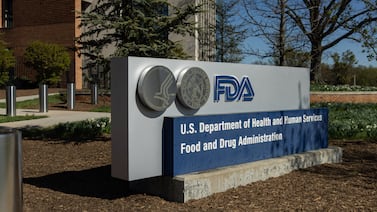Public health, explained: Sign up to receive Healthbeat’s free national newsletter here.
As Health and Human Services Secretary Robert F. Kennedy Jr.’s dismantling of federal vaccine policy continues to roil the Centers for Disease Control and Prevention, some Democratic-led states have struck out on their own, setting up new systems to help them assess the science and maintain immunization access for their residents.
Four Western states — California, Hawaii, Oregon, and Washington — have created a collaborative to preserve access to vaccines. Several Northeastern states have done the same.
New York’s governor declared a “statewide disaster emergency” that allows pharmacists to give Covid-19 vaccines without a separate prescription. Minnesota made a similar change, and Massachusetts is requiring insurance carriers to pay for vaccines recommended by its health department, not only those recommended by the CDC.
The changes represent a significant shift in public health authority from the federal government to the states. Traditionally, states have looked to the CDC for expertise and guidance on public health issues — including, in addition to vaccines, workplace safety, water fluoridation, vaping, and sexually transmitted infections.
Now, amid concerns that Kennedy is undermining trust in vaccines and public health science, some states are charting new paths, seeking out new sources of scientific consensus and changing how they regulate insurance companies, prescribers, and pharmacists.
Colorado has been at the front of this wave. On Sept. 3, state officials issued a standing order to let pharmacists provide Covid shots without individual prescriptions.
“I will not allow ridiculous and costly red tape or decisions made far away in Washington to keep Coloradans from accessing vaccines,” said Democratic Gov. Jared Polis.
Colorado changes law to allow other sources for recommendations
But Colorado’s leadership had been clearing the way for more autonomy on vaccine policy for months.
In March, the state legislature voted to change a law so the state could consider scientific sources other than the federal government when setting school vaccine requirements.
“You could see the writing on the wall that it was just becoming overly politicized rather than relying on actual science with this new HHS director,” said state Sen. Kyle Mullica.
Mullica, who co-sponsored the new law, is a Democrat and works as an emergency room nurse in the Denver area.
Colorado is among the first states to change its laws to allow it to recommend vaccines based on sources other than the CDC. The state health board can now also consult leading medical groups, like the American Academy of Pediatrics, American Academy of Family Physicians, and American College of Obstetricians and Gynecologists.
“We decided to protect Colorado,” Mullica said, so it “wouldn’t be as vulnerable to political upheaval that we’re seeing right now.”
The Democratic-led legislature passed the bill in a near-party-line vote. Polis signed it into law in April, despite having praised Kennedy’s selection last fall.
“Colorado I think is really leading the way on this,” said David Higgins, a pediatrician at the University of Colorado who was part of a stakeholder group that helped craft the bill.
Higgins pointed to a companion bill, signed in May, that he said makes Colorado’s push even stronger. It deals with insurance coverage for preventive health care services, aiming to ensure state-regulated insurance plans cover the cost of some vaccines, regardless of future moves by the CDC.
“Effectively, it’s meant to help ensure that Coloradans will still have access to vaccines,” he said.
The Colorado chapter of Children’s Health Defense, the anti-vaccine advocacy group that Kennedy led before taking over HHS, did not respond to a request for comment.
Another co-sponsor of the first bill, Democratic state Rep. Lindsay Gilchrist, said the circulation of so much false information about vaccines, including for Covid, makes it important to hear from a range of trusted medical experts.
Colorado had previously looked to the CDC for scientific guidance on vaccines, particularly for children entering school. Like other states, it had tracked the recommendations of a CDC panel known as the Advisory Committee on Immunization Practices.
Kennedy fired all 17 members in June and replaced them with 12 new appointees, some of whom critics warn are vaccine skeptics and aren’t qualified to provide critical guidance for Americans.
“I think where the confusion will lie is the difference in the recommendations between the ACIP, who we traditionally defer to, and then everyone else,” said Ned Calonge, Colorado’s chief medical officer.
He expects that the national professional physician groups that Colorado is now empowered to consult will likely be aligned in their overall guidance and will “look at the last evidence-based recommendations that were provided by the ACIP” before Kennedy replaced its members.
In May, Kennedy announced the federal government had removed Covid vaccines from the list of shots recommended for healthy pregnant women and children.
Colorado recommends Covid shot during pregnancy
But Colorado is still recommending a Covid vaccine during pregnancy, Calonge said.
“There’s been no new evidence of issues of safety in that population,” Calonge said. “So, we’re telling providers that our recommendation is to continue to follow the recommendation as it was in place in January of 2025.”
In a statement on its website, the American College of Obstetricians and Gynecologists strongly recommended pregnant individuals get vaccinated against Covid. “ACOG continues to recommend that all pregnant and lactating individuals receive an updated Covid-19 vaccine or ‘booster,’” it said.
Likewise, the American Academy of Pediatrics recommended in August that all children from 6 to 23 months old get vaccinated against Covid, as well as older children in certain risk groups.
For now, Colorado is following the same immunization recommendations it used last year.
The most recent ACIP meeting, on Sept. 18 and 19, was chaotic, with members admitting they did not understand what they were voting on and even opting to redo a vote on pediatric MMRV vaccine access. The next ACIP meeting is scheduled to take place Oct. 22 and 23 and could result in additional changes to vaccine recommendations.
Doctors and vaccine scientists have expressed alarm at the splintering national consensus on vaccines.
“There’s now going to be much more confusion and distrust of vaccines among the public,” said Allison Kempe, a professor of pediatrics at the University of Colorado School of Medicine, who served on the ACIP from 2013 to 2018.
Still, she said she’s glad Colorado is forging ahead with its own recommendations.
This article is from a partnership that includes Colorado Public Radio, NPR, and KFF Health News, Healthbeat’s national reporting partner.






